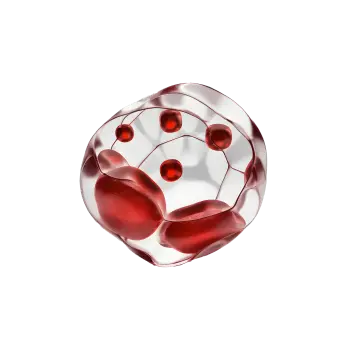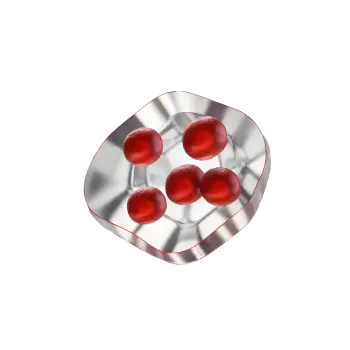What is anemia?
Anemia is defined as a decrease in the number of red blood cells or the amount of hemoglobin in the blood. Red blood cells are responsible for carrying oxygen from the lungs to the body's tissues and organs. Hemoglobin, a protein in the red blood cells, binds to the oxygen and enables it to be transported around the body.
Anemia can occur for a variety of reasons, including blood loss, insufficient production of red blood cells, or rapid breakdown of red blood cells. There are also different types of anemia, such as iron deficiency, vitamin B12 deficiency, and hemolytic anemia.
Causes of anemia or blood deficiency
Blood loss
A common cause of anemia is blood loss. It can be due to acute bleeding, such as in an accident, or chronic bleeding, such as during menstruation or bleeding from the gastrointestinal tract. Blood loss leads to the body losing red blood cells and thereby reducing the number and amount of hemoglobin in the blood.
Low production of red blood cells
Another cause of anemia is insufficient production of red blood cells. It may be due to a lack of nutrients such as iron, vitamin B12 or folate , which is necessary to produce red blood cells. Lack of these nutrients can be the result of a poor diet, malabsorption of nutrients in the gut or lack of production of these substances in the body.
Some diseases and conditions can also affect the bone marrow, where the red blood cells are formed. Examples of such conditions include bone marrow diseases, chronic kidney diseases and inflammatory diseases. These conditions can inhibit the production of red blood cells and thus lead to anemia.
Increased breakdown of red blood cells
A third cause of anemia is rapid breakdown of red blood cells, which is called hemolysis. Hemolysis can be the result of autoimmune diseases where the immune system attacks the red blood cells and destroys them. It can also be due to genetic diseases such as sickle cell anemia or hereditary spherocytosis.How do I know if I have anemia?
The symptoms of anemia can vary depending on the underlying cause and severity of the anemia. Common symptoms of anemia include:
- Fatigue and exhaustion
- Weakness and muscle weakness
- Paleness of the skin and mucous membranes
- Shortness of breath and rapid breathing
- Dizziness and fainting
- Headache
- Palpitations and irregular heart rhythm
- Cold hands and feet
It is important to note that the symptoms of anemia can be mild or severe depending on the degree of anemia and individual factors. If you experience any of these symptoms or suspect that you may have anemia, it is important to consult a doctor for a proper diagnosis and treatment.
Diagnosis of anemia by blood analysis
To diagnose anemia, a doctor needs to assess your symptoms, medical history and conduct various blood tests. The test results may include a complete blood count to measure the number of red blood cells, hemoglobin and other blood components. Additional tests may also be necessary to determine the underlying cause of the anemia, such as iron status, vitamin B12 levels, folate or, in some cases, bone marrow biopsy.
Prevention of anemia
There are several ways to prevent anemia and maintain a healthy level of red blood cells and hemoglobin in the body. It is important to eat a balanced diet rich in iron, vitamin B12 and folic acid. Foods rich in iron include meat, seafood, legumes and green leafy vegetables. Foods rich in vitamin B12 include animal products such as meat, fish, eggs and dairy products.






















